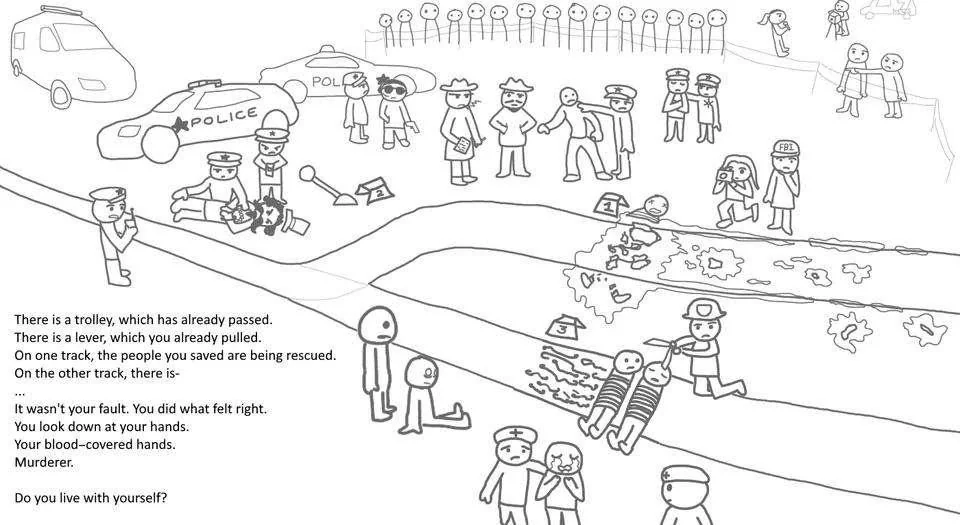this post was submitted on 30 Sep 2024
319 points (99.1% liked)
196
16776 readers
3871 users here now
Be sure to follow the rule before you head out.
Rule: You must post before you leave.
founded 2 years ago
MODERATORS
you are viewing a single comment's thread
view the rest of the comments
view the rest of the comments

I find this dilemma fails to actually deliver the point.
If you do not act you are not absolved of morality because you had a choice. You made a choice and your morals were tested.
Also saving greater numbers over lesser does not make you a murderer. It makes you a hero.
There is no moral dilemma, you couldn't have saved all of them. The murdered is the person who tied them up with the intent to kill.
Kant would disagree.
Many philosophers (many of whom are Kant's contemporaries,) think Emmanuel Kant can be a dick sometimes.
But Kant would argue by pulling the lever and getting involved, you are taking responsibility, but ultimatly the guy(s) who secured the victims to the tracks are to blame. And your lawyer will argue this in both criminal and civil court.
By being there you're already involved whether you want to be or not. You're in it now and you're expected to make a choice. Failure to choose is also one of the choices.
The lever operator can't be at fault, or to blame, for the situation - but they are absolutely involved. That's the point of the exercise. From the moment you notice the trolley tracks and the lever you are now entwined with the fates of the people that are here, and the trolley problem will force you to choose a bad solution that you won't feel good about - because there are no good solutions. It's the Kobayashi Maru of psychological exercises.
I think you misunderstood. It's the scenario that's flawed not what happens when you pull the lever.
Whoever set up the contraption has responsibility.
Yes, but partitioning blame is not the point. Thomas Aquinas wouldn't touch the lever, because doing so may jeopardize his path to heaven.
Kant wasn't around when Nazi Jew hunters were literally scouring Europe for hidden Jewish refugees, but he did address the murderer at the door and argued it was right and proper not to lie to the murderer to protect a friend.
Sartre and Camus (and pretty much all their contemporaries) had to deal with real Nazis, so they'd pull the damn lever because ultimately it doesn't matter who set it up, even if they successfully escape to Brazil or Argentina. The situation is here and now and up to us to act. (And while there are few literal trolleys, there are plenty of instances in which a smaller mischief supports a greater good, or preventing a greater harm, sometimes involving selecting who lives and dies.)
A mother would steal medicine for her sick and dying kids, for instance, and rightly so, which is why it is necessary to create a society in which she doesn't have to, and defy the society that prevents her from caring for those children.
Countless Muslims in Spain would eat pork before their colleagues and before God so as to not be discovered and reported to the Inquisition. But then in Islam (by my limited comprehension) God forgives when you do what you do to survive.
There's no right answer to the Trolley problem. It happens to be a paradox of deontological ethics (mores defined by creed) but its point in full form is to show that there are often no right answers, and we are driven as much by what we feel is right or wrong, as by what we compute is the most rational ethic.
The Trolley problem just happens to be the one turned into a meme, and is easy to draw on a chalkboard in philosophy class.
I agree. Stated another way, imagine the trolley is headed towards 5 people, and you have the power to pull the lever to divert it to a path where there are no people. Even if someone tied those 5 to the tracks with the intent to kill, your failure to save their lives (at no additional cost to others) is widely regarded by most systems of ethics/morality as a moral failing. Yes, the person who tied the tracks bears blame, but so does the person who could've easily saved them but chose to let them die.
It’s almost difficult to believe Kant wasn’t just pulling a Schrödinger and proposing a ridiculous thought experiment to illustrate the absurdity of genuinely holding those views.
The idea that morality exists only as an intrinsic quality of an action, regardless of context or consequence, is more theology than philosophy. It’s useless to the point of harm to anyone faced with a world beyond a university or a monastery.
You hold the opinion that deliberate inaction is an action in itself, that the worth of lives can be quantified and from that conclude that a failure to reduce a loss in life is tantamount to condemning those lives to death. That conclusion is valid under those premises, but the point of the dilemma is that not everybody agrees with those premises.